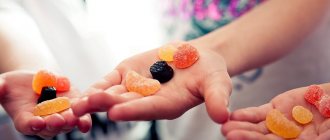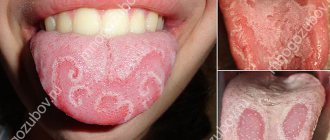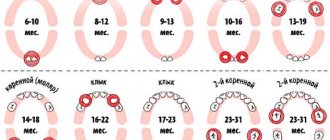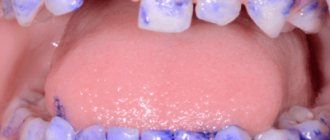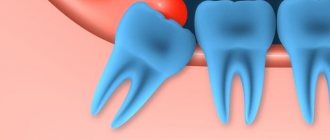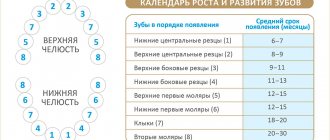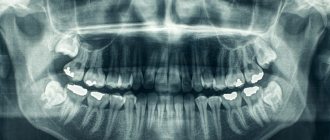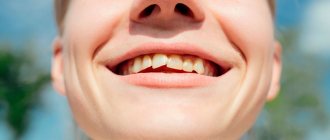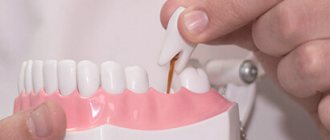Almost all parents are aware of when the first baby teeth should appear, but in most cases they do not know when their children’s baby teeth begin to fall out, and therefore are not always ready for the start of the bite change. In addition, some parents believe that the fourth and fifth teeth are already permanent, although in fact all 20 baby teeth, which usually erupt in a baby by the age of 2.5-3, will fall out over time and will be replaced by permanent ones.
At what age do children lose their first teeth?
According to statistics, the first baby tooth leaves the socket when the child turns 5-6 years old. The process of changing teeth occurs gradually (otherwise babies would not be able to chew).
Various factors influence the age at which a baby’s first molars appear:
- health of baby teeth;
- fetal development during pregnancy (the rudiments of teeth appear in the womb);
- characteristics of the baby’s body.
What to do when your first baby tooth falls out?
During the period of changing teeth, the child’s oral cavity needs to be cared for especially carefully. In addition, you need to ensure that the baby’s diet is correct and balanced, because this is also very important for oral health. Here's what to do when your first baby tooth falls out:
- Brush your teeth at least twice a day, preferably every time after meals.
- Use rinses or herbal infusions after meals.
- Contact your dentist in a timely manner for examinations and monitoring of changes in bite.
- Treat caries and other oral diseases in a timely manner.
- If necessary, seal the fissures as a preventive measure.
- Make sure that the child’s menu contains as few harmful foods as possible - too hard, containing fast carbohydrates (all kinds of sweets, confectionery), carbonated drinks.
- Include more foods rich in calcium, phosphorus, and vitamin D in your diet: beef liver, sea fish, eggs, cottage cheese, sour cream, hard cheese, butter.
- Give the child more “correct” solid food to stimulate the resorption of the roots of baby teeth - apples, carrots and other solid vegetables and fruits.
Which teeth fall out first?
Although the age at which primary teeth are replaced by molars varies and is sometimes difficult, the order in which they fall out is the same for almost all children.
- Sixes begin to grow first. These teeth are not baby teeth, but in all children they are the first to make themselves known.
- Then the lower and then the upper incisors begin to loosen.
- After the incisors, a variety of teeth become loose in different orders and fall out.
- The last ones to loosen and fall out are the fangs.
The process of developing a child’s bite lasts quite a long time – up to 13-14 years. And, by the way, if a child’s baby teeth were uneven, this does not mean at all that the molars will grow the same. It is likely that the teenager will be proud of his Hollywood smile. A permanent bite is formed regardless of the past.
Why is the order of changing teeth important?
First, the incisors, and only then the molars and canines - this order determines the normal course of jaw development and the formation of a correct bite. If teeth fall out in the wrong order, this can lead to malocclusion and subsequent problems.
Malocclusion is not only an aesthetic problem that changes facial features, but a physiological one. As a result, pronunciation and clarity of speech are impaired, the quality of chewing food deteriorates, which can lead to disruptions in the functioning of the gastrointestinal tract.
Several reasons can cause a disorder in the order of tooth loss:
- trauma - the baby hit himself and knocked out or damaged a tooth, causing it to fall out prematurely;
- diseases of the oral cavity - enamel hypoplasia, caries or pulpitis.
It happens that parents “neglect” the condition of the child’s oral cavity, believing that there is no need to care for or treat baby teeth. They'll fall out soon anyway. This leads to negative consequences.
Firstly, the baby does not develop a culture of oral care. And at an older age, he will not closely monitor the health of his molars, which will cause the active development of carious processes and their early loss.
Secondly, caries of baby teeth is not a harmless disease. It destroys teeth, causing them to fall out earlier, spreads aggressively in the mouth and can infect the molars and molars, which are located in the gums. Caries in children must be treated. And the sooner parents notice white or dark spots on the enamel and the sooner they consult a doctor, the greater the chance that the doctor will “catch” the disease at an early stage. And it will not have time to lead to dangerous consequences for the baby’s health.
If the order of changing teeth is disrupted as a result of injury or illness, you should consult a doctor. It is important to consult a pediatric dentist to help get rid of oral diseases. And also an orthodontist, who will recommend options for correcting the primary bite and select means that do not allow the teeth located next to the freed space to move arbitrarily.
pixabay.com/
Is the child worried?
Many parents worry that when their children lose their baby teeth, they will develop complexes. Actually this is not true. Of course, loose and falling teeth bring physical discomfort to children, however, they do not worry about the unaesthetic appearance. After all, most of their friends also walk around with lost teeth.
When a child's first tooth falls out, the baby may be bothered by the socket that appears as a result of tooth loss. The baby's curiosity inevitably develops, and he constantly tries to touch the socket and the growing molar with his tongue (or even his finger) in order to explore new sensations.
Parents definitely need to explain to their child that this should not be done: your hands can introduce an infection into the mouth, which can cause teeth and gums to become sore.
There is no need to worry if ichor comes out of the hole after a tooth falls out. In this case, you need to let the baby rinse his mouth with a soda solution. If the wound is actively bleeding, you can let the child lightly bite on a cotton pad or gauze pad.
Adviсe
A loose tooth is of considerable interest to a child. The baby just wants to touch it. How should parents behave in such a situation:
- If you notice that your baby's first tooth will soon fall out, be sure to tell him about what is about to happen. Explain that there is nothing wrong with this. A new, stronger tooth will grow in place of the fallen one.
- It is very important to explain to your child that you should not touch your teeth with your hands. Kids do this quite often, especially when their teeth begin to loosen. It's so interesting and incomprehensible. Try to explain clearly that in this way the child can get an infection. You must understand that this can lead to the development of inflammation and cause pain.
- You need to be prepared that when a tooth falls out, blood will begin to ooze. The main thing here is not to panic. Make sure that the baby is not scared. To stop it, you need to give the child a soda solution (a teaspoon per glass of warm water). Let your baby rinse his mouth until the wound stops oozing.
- There is no need to give your child anti-inflammatory medications or analgesics. They are not necessary.
How to behave if your child’s first tooth falls out?
The first baby tooth that falls out is another step towards growing up. So why not mark this event with some interesting ritual for the child, so that further loss will be easier for the baby and bring more joy.
Tooth Fairy
Give your baby a little magic. Let the good sorceress take the first tooth from under the pillow while he sleeps, and in return leave a small gift: candy, a coin or a toy. The next baby tooth that falls out will bring joy to the baby.
Mouse
Another tradition that children really like is to give a lost tooth to a mouse. The mouse will chew the old tooth, and a new one will appear in its place.
Together with your baby, you need to find a secluded corner in the house and put the fallen tooth there. At night, a mouse will run into the corner and take it away.
We hope that falling out baby teeth and emerging permanent teeth will not cause trouble for either children or parents. And to make the first molars give the baby even more joy, we have developed a special Asepta Teens toothpaste to protect and strengthen the enamel of permanent teeth in children over 8 years old. The paste increases the resistance of enamel to bacteria and acids, helps saturate teeth with calcium and phosphorus, and provides effective protection against caries and gum inflammation. And the rich taste of apricot, peach and cream will turn brushing your teeth into a real treat.
Signs about teeth
In fact, there are many different beliefs. I will introduce you to the main ones:
- It was believed that a baby who was born with a tooth would have a great future and even military glory.
- Pay attention to the distance between the upper front teeth. It is believed that if a coin fits into this space (sideways), the child will become rich.
- If your little one gets his first tooth ahead of schedule, you will soon become a mother again.
- There is a well-known sign that shows the number of sisters or brothers a baby has. To do this, you need to calculate how many teeth a child has per year. However, now it’s hard to believe in such a sign. After all, most children at this age already have more than five teeth.
- It is a good custom to give your baby a silver spoon when the first tooth appears. It will become a talisman for the child. It was also considered important to knock on the erupted tooth with a silver spoon so that the remaining teeth would come out quickly and painlessly.
- Many peoples considered it unacceptable to allow someone to find a child’s lost tooth. In most cases, this was due to the belief that evil sorcerers or witches could speak with a tooth and bring trouble to the child.
Now you know what you can do with a lost tooth. The main thing is not to panic. Explain to your child that everything is fine and this is a normal physiological process. To make it easier for your child to survive such an event, which may well become stressful for him, it is better to come up with some kind of fairy tale, introduce a character into the story.
First steps in case of loss
A baby whose milk elements begin to change does not need painkillers. Adults think that the procedure of changing units is extremely unpleasant for the child, but before the tooth begins to loosen, the roots in it dissolve.
Losing teeth can be a shock to little ones, so parents should explain to them that this is normal, and new healthy teeth will soon grow and remain forever. At the age of 7-14 years, the oral cavity needs careful hygiene, and after removal, the following rules must be followed:
- immediately rinse your mouth with soda;
- prohibit the child from touching the wound to avoid infection;
- When the meal is over, rinse your mouth with warm water.
To help with loosening, you can give your child hard fruits and vegetables: apples, pears, carrots. Dried fruits in small quantities are also suitable.
In what cases is a doctor's help required?
There are situations when problems arise with the change of organs in the mouth.
In 80% of children, it is discovered that the permanent molar erupts behind the milk tooth, and this forms an incorrect bite. A temporary formation that does not want to leave its place is removed surgically. This will avoid the growth curve of the root element. Only a dentist will be able to pull out a unit if its root has not resolved, but has grown deeply into the gum. Self-removal can cause severe inflammation of the mucous membrane. In most cases, baby teeth fall out on their own. A child may need specialist help in several atypical situations:
- the gums are swollen and very painful;
- the milk element is broken;
- the wound bleeds for a long time;
- the child swallowed a tooth.
Folk remedies
Natural antiseptic and anti-inflammatory traditional medicines are also used for rinsing:
- a decoction of herbal tea, which includes chamomile, oak bark, sage and St. John's wort;
- decoction of chamomile and calendula flowers;
- tincture on golden mustache leaves;
- eucalyptus decoction.
As for the popular soda-saline solution, dentists are ambivalent about this product. On the one hand, it stops inflammatory processes, and on the other, it irritates tissues. It is recommended to abandon soda and salt in favor of a modern antiseptic without side effects.
Drugs
Antiseptics that do not contain alcohol are suitable for treating the oral cavity, since it burns tissue and further injures already damaged and painful areas.
Miramistin
The safest and most effective broad-spectrum antiseptic that copes with bacterial, fungal and viral infections. Miramistin has been used since 1991, its effectiveness has been proven by hundreds of thousands of patients. It is absolutely harmless and can be used by children from the very first days of life, pregnant women and women during lactation.
Pharmacies sell only one type of Miramistin solution with a concentration of the active substance of 0.01% - it is impossible to make a mistake with the choice. The drug is available in various forms of release - in the form of an aerosol, mouthwash and in a bottle with a urological nozzle. For speedy gum healing after tooth extraction, an aerosol and rinse solution are suitable.
If this clot is “washed out,” food debris gets clogged into the cavity of the former root, healing is delayed and accompanied by pain.
Miramistin is used no more than 4 times a day for 5-6 days. The average cost of a bottle is 200-300 rubles (more expensive with a sprayer).
Hydrogen peroxide
Immediately after removal, dentists wash the surgical area with a 3% solution of hydrogen peroxide, a powerful antiseptic. However, it is not advisable to use peroxide at home.
When the antiseptic comes into contact with the surface of the wound, active foaming occurs: this is how oxygen is released from the peroxide, the bubbles of which cover the wound surface. The process is dangerous due to the risk of damaging the blood clot, and in addition, hydrogen peroxide causes irritation of the mucous membrane.
Potassium permanganate
This once popular antiseptic, familiar to everyone under the name “potassium permanganate,” must be forgotten once and for all. Since 2007, potassium permanganate has been excluded from free sale; it can only be purchased with a doctor’s prescription in compounding pharmacies. Using potassium permanganate to rinse the mouth can cause burns to the mucous membrane, so it is better to give preference to a modern and safe antiseptic.
Furacilin
A popular antiseptic recommended for purulent-inflammatory complications after tooth extraction. It is available for sale in liquid form, but most often in pharmacies they sell Furacilin tablets - bright yellow in color. To prepare a rinse and bath, 10 crushed tablets are diluted in a liter of boiling water, the resulting mixture is cooled to 35-40 degrees.
How to rinse after tooth extraction for quick healing
Removing a tooth is not the end of the problems associated with it. After visiting the surgeon, the patient is left with an inflamed wound in the mouth: it periodically bleeds and hurts. The best way to speed up healing and protect the wound from germs is rinsing and bathing.
Baths are indicated a day after removal, and rinsing only a few days later. How to treat the oral cavity and what medications are best to use for quick healing of the hole - read on.
Possible complications
A common complication after tooth extraction is purulent inflammation of the socket, which is called alveolitis. Usually occurs when a blood clot breaks down prematurely and the wound is exposed. Among the reasons are also poor oral hygiene in the postoperative period and weakened immunity.
Left untreated, alveolitis is a sure path to osteomyelitis - purulent processes in bone tissue. In the most severe cases, the infection enters the blood and sepsis begins - blood poisoning, dangerous not only to human health, but also to his life.
